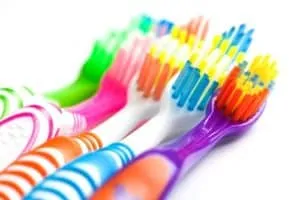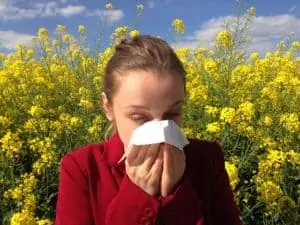Preventive Dentistry

Brush & Floss. One of the easiest resolutions you can make for better oral health is to brush and floss your teeth regularly. This means brushing twice a day, every day, and flossing once a day. Use a soft-bristled toothbrush and fluoride toothpaste to gently (emphasis on gently) scrub away bacteria and plaque buildup. But brushing alone doesn’t reach all surfaces of your teeth. This is where flossing comes into play. Flossing between each and every tooth daily removes the things that brushing alone can miss. Following this at-home oral health routine is one of the best ways you can improve your oral health.
Drink Water. Drinking water is a simple thing that can make a big difference in your health. Being hydrated allows our bodies to function properly and efficiently. It’s also great for oral health; water rinses away bacteria and neutralizes acid which, if not removed, will cause decay and cavities. Water can also keep breath fresh by fighting off dry mouth. This year, commit to drinking at least eight, 8-ounce glasses of water every day and drinking other beverages in moderation.
Visit Your Dentist in Sparks. We recommend dental visits at least every six months, sometimes more if appropriate. These dental checkups are important for several reasons including:
- Deep cleanings to remove plaque and tartar buildup
- Diagnosing any problems early before they cause bigger problems
- Monitoring oral health for signs of potential disease, whether oral or systemic
Many systemic, whole-body problems such as heart disease and diabetes can actually first show signs and symptoms in the mouth. When caught early at your regular dental appointments, treatment can be easier and more successful. Signs of more oral-specific problems such as gum disease and oral cancer can also show signs early, making the chances of solving these serious problems more likely.
The best way to follow through with New Year’s resolutions is to write them down, make a plan, and stick with it. When it comes to resolutions involving your oral health, the team at our Sparks dental office is here to help. Call us to schedule an appointment today and let’s get started on the best year your smile has ever seen.

Chewing Ice
We understand that sometimes you just want to chew on the refreshingly cold ice in your drink. But you really shouldn’t. Chewing on really hard ice cubes can cause tiny chips in your teeth and can even break a large piece of a tooth right off. Gnawing on big pieces of ice can even damage existing dental work such as fillings or crowns which would then need to be repaired.
Biting Your Nails
Biting your nails is a habit that’s dangerous for your smile and your overall health. Your nails are a perfect place for tons of bacteria to hide and a great spot for you to pick up more bacteria from all the things you touch throughout the day. Now, think about what may be getting into your mouth as you bite or chew on your fingernails? Pretty gross, huh? But that’s not all. Biting your nails can cause chips and cracks in your teeth and may even contribute to jaw pain or damage.
Brushing Too Hard
Believe it or not, there is such as thing as brushing your teeth too hard. A rough tooth scrubbing can scratch the protective layer of tooth enamel and actually leave teeth at increased risk for decay. Using a medium or hard bristled toothbrush may also cause similar damage to teeth. Your gums can also be negatively affected by brushing too hard. They can recede, exposing more of the tooth roots and increasing sensitivity.
Eating Acidic Foods
Acidic foods like citrus fruits such as lemons, oranges, and grapefruit can erode tooth enamel and leave teeth exposed to bacteria, increasing the likelihood of decay as well as sensitivity. When you do just have to have that orange or drink that glass of wine, try to pair it with drinking a glass of water to neutralize the acids.
Smoking
Smoking, or really using any type of tobacco, can greatly increase the chance of developing scary oral health problems such as gum disease and oral cancer. Both of these serious health problems can lead to other issues all their own. Smoking can also affect the appearance of teeth by causing them to yellow or take on a slightly brownish tint.
Your dentist in Sparks is dedicated to helping you get and keep a smile you’re proud of. Besides maintaining regular dental appointments and brushing and flossing regularly, pay attention to how some of your daily habits can affect your smile. Try to reduce the risk of damage by knowing your habits and working to stop them.

How Smoking Affects Your Oral Health
One of the commonly overlooked dangers of smoking is how it affects oral health. But it’s certainly a concern for your dentist in Sparks. The truth is, several oral health problems are directly related to smoking, and continuing to smoke can put you at increased risk for:
- Dry mouth
- Bad breath
Tips to Quit
Smoking is addictive and therefore not easy to quit. Some people even try quitting multiple times before they succeed at never picking up another cigarette. We understand how difficult quitting can be and are here to provide support for anyone looking to improve their health by never lighting up again.
- Find a Support Team. Trying to do something as difficult as quitting smoking isn’t easy to do on your own. Sometimes it’s made easier by finding trusted friends, family members, or health professionals to help. Make sure your chosen quit team can be supportive in the way you need them to be and set up a plan with them.
- Identify Your Reasons to Quit. Writing out a physical list of why you want to quit smoking can be a great first step to success. Seeing your reasons on paper may help them feel more ‘real.’ When you have a strong craving, get out your list and remind yourself all of the reasons why quitting is important.
- Know Your Triggers. Part of what can make quitting so difficult is that smokers often develop a routine to when they smoke — on the car ride to work, when drinking alcohol, drinking coffee in the morning, to name a few. While some triggers may be harder to avoid than others, try your best to steer clear of anything that will make you want to light up.
- Find Alternatives. Another thing that makes it difficult to quit smoking is that smokers get so used to having something in their hand that when they suddenly don’t, it feels uncomfortable. Keep your hands busy by holding a pencil or straw. This can mimic the feeling of a cigarette and ease the mind.
This year’s Great American Smokeout can be your time to finally quit smoking. On November 15, make a plan to quit and stick to it. Select a quit date and take the steps to become smoke free by that date. Your physician, along with our Sparks dental office, can also provide you with additional ways to help.

What Are the Responsibilities of a Dental Hygienist?
Many people know that dental hygienists are responsible for giving each and every patient a thorough, in-depth cleaning at their appointments. But the responsibilities of hygienists go far beyond dental cleanings. These team members also help educate patients on any oral health concerns and proper at-home care, identify any problems early, and are focused on preventing these problems in the first place in order to keep patients healthy. After all, according to the American Academy for Oral Systemic Health (AAOSH), there is a link between oral health and several problems that can affect the entire body such as heart disease, diabetes, and stroke.
What’s Required to Become a Dental Hygienist?
The first step to becoming a dental hygienist is to get an associates degree. As of 2017, there were more than 300 accredited dental hygiene programs available in the United States. These programs can be found at local community colleges, technical schools, and universities. To earn a degree in dental hygiene it takes about three years of schooling, including labs, clinical work, and classroom lectures. An interest in the sciences including biology, chemistry, and anatomy would make the coursework and a dental hygiene career more enjoyable. Once a degree is earned, dental hygienists are usually required to pass a licensing test.
Top Tips for Patients
When you visit your dentist in Sparks, you will most likely have some time with a dental hygienist. Besides preventing any dental problems from popping up, this hygienist is also responsible for passing along information on how you can keep your teeth healthy in between visits. Some of the most helpful tips are below.
- Brush for Two Minutes
Brushing every day is great, but brushing twice a day using correct technique and for the recommended two minutes is even better. Use a soft-bristled toothbrush and small, gentle circles instead of scrubbing back and forth.
- Floss Regularly
When you don’t floss regularly, you’re leaving about 35% of each tooth uncleaned. That greatly increases the likelihood that bacteria will wear away enamel and cause decay. Flossing in between every tooth and up under the gum line can minimize this risk.
- Use Mouthwash, But Choose Wisely
Many times mouthwash is used as a breath freshener, but if you’re using the wrong mouthwash for you it can actually make bad breath worse. If you choose to use mouthwash, choose one with the ADA Seal of Acceptance or talk with your hygienist about what’s right for you.
This October, and at every visit, we hope that you will thank your dental hygienist for doing their part in keeping your smile healthy. If it’s been longer than six months since your last dental cleaning, we welcome you to call our Sparks dental office to schedule an appointment today.

Watch What You Eat
Of course if you eat a pasta dish packed with garlic or a hot dog loaded up with diced onions your breath is going to tell everyone you talk to what you had for lunch. But your diet can affect your breath long-term, too. Eating enough fresh and crunchy fruits and veggies such as apples, carrots, or celery regularly will help rub off any bad breath bacteria that may be sticking around on teeth.
Brush, Brush, Brush
Brushing your teeth for two minutes twice a day not only protects your pearly whites from decay and cavities, it also helps remove any bacteria that’s built up throughout the day (or night!). Besides brushing, flossing helps get rid of the more stubborn bacteria that have wiggled their way up under gums. Don’t forget about your tongue either. A gentle brush or a swipe of a tongue scraper will take care of any bacteria that’s left over.
Fight Off Dry Mouth
There are many things that can cause dry mouth including smoking, mouth breathing, and even certain medications. While dry mouth is uncomfortable, it may also a contribute to bad breath. When a mouth is dried out there’s not enough saliva to clean away bad breath bacteria, which builds up and gives off an unpleasant smell. To protect yourself from dry mouth and bad breath drink a lot of water, talk to your doctor about possibly using a different medication, and make a plan to quit smoking.
Stop Smoking
Speaking of quitting smoking, smokers tend to suffer from something known as smokers’ breath. This unique smell is caused by the tobacco itself and also from the chemicals found in cigarettes. These chemicals bring a stench all their own which lingers around even after someone is done smoking. Quitting can help your health in more than ways than helping freshen your breath. It can reduce your risk for heart disease and several types of cancer.
It Could Be More Than Just Bad Breath
Bad breath doesn’t only affect oral health. The truth is it can also be a sign of a problem somewhere else in the body. Not all bad breath smells the same, and different smells can indicate various health concerns. For example, a slight stench of ammonia may be a symptom of liver cirrhosis. Bad breath has been tied to many systemic diseases including kidney disease, cystic fibrosis, and respiratory infections.
Bad breath should be taken seriously. If it’s a chronic problem, you should see your dentist in Sparks as soon as possible.
Nobody should have to live with the embarrassment of bad breath or the fear that it’s a sign of something serious. Our dental office in Sparks can help. We encourage you to give us a call to schedule an appointment with our trusted team today. We’ll talk with you about your health history, habits, and discuss the best solutions to get rid of your bad breath.

Schedule an Appointment
The path to a whiter smile begins by scheduling an appointment with your dentist in Sparks. During this visit you’ll talk with your dental team about what you don’t like about your smile, any areas that particularly bother you, and share what you’d ultimately like to see. After discussing your objectives, your dentist will make the best recommendation to help you get the look you want.
Veneers & Tooth Whitening
Two of the most common ways to get a whiter smile are with dental veneers or professional smile whitening. Veneers are custom-created to match the shape and size of the rest of your teeth, but can be brighter than your natural teeth. They’re adhered to the surface of your teeth and can totally transform your appearance. Tooth whitening, while is also often successful at brightening a smile, may be more appropriate for surface stains or stains that are fairly new.
Eat Smart
Whether you decide to have dental treatment done or not, there are things you can do to help get and keep your teeth white. One way is to watch what you eat and drink. Coffee, tea, red wine, soda, and berries, for example, can all stain smiles. Instead, try to choose fresh fruits and vegetables such as carrots, apples, or celery. These foods aren’t only good for you, they can actually prevent stains from sticking to teeth. Besides limiting your intake of foods or drinks that can stain, try to use a straw whenever drinking. Straws will help keep liquids and their staining ingredients off of teeth.
Don’t Smoke
Smoking or using any type of tobacco product will increase the chance of tooth discoloration. The ingredients found in cigarettes and smokeless tobacco cause yellowing of teeth and may even make teeth appear brown and spotty. Using tobacco also raises the risk of developing gum disease and oral cancer, both of which are serious concerns that could lead to tooth loss and other problems throughout the body.
See Your Dentist
Perhaps the best way to keep your smile white and healthy is to see your dentist at least twice a year. These checkups will help remove sticky plaque from your teeth that you just may not be able to get at home. Plaque can act as almost a glue for stains and the more of it there is, the more likely stains will stick around.
If you’ve been eating well, drinking plenty of water, aren’t a tobacco user, and still aren’t happy with the way your smile looks, we encourage you to call our Sparks dental office to schedule a consultation. It’s the first step to getting a whiter smile.

What Do the Studies Say?
This is a great question with a not-so-easy answer. Essentially, it depends on who you ask. The American Dental Association (ADA), for example, states that both manual and electric toothbrushes do what they’re supposed to do — clean teeth by removing plaque and bacteria. Researchers don’t provide a solid conclusion on whether one tool necessarily cleans better than the other. What they do say, however, is that getting a thorough clean isn’t so much about the type of toothbrush used but rather the brushing technique.
On the other hand, companies that make electric toothbrushes publish research occasionally that backs up their claim that electric toothbrushes are better at cleaning teeth than manual toothbrushes. One such study published in the Journal of the American Dental Association reported that nearly 13,000 out of 16,000 participants said they had better oral health after using an electric toothbrush for the duration of the study.
When it really comes down to it, you should pick a toothbrush that you’ll use regularly and fits your unique needs. A good place to start your search is by asking your dentist in Sparks and by analyzing the pros and cons to both manual toothbrushes and electric ones.
Weighing the Pros & Cons
Knowing the pros and cons to both types of toothbrushes can help you narrow your search.
Manual Pros
- Cheaper
- Portable
- No need for chargers
Manual Cons
- No timer makes it too easy to brush too quickly
- May be difficult for some to use a proper technique resulting in a less effective clean
- Allow for easier tough scrubbing which can damage enamel and gums
Electric Pros
- Easy to use
- Some come with built-in timers
- Promote gentle, proper brushings
Electric Cons
- More expensive up front
- Replacing the heads is expensive, too
- Inconvenient for those who travel
If you’re still not sure what the best choice is for you, give our Sparks dental office a call to schedule an appointment today. We’re always welcoming new patients and will be happy to help.

Preventive Care Protects
Even if you brush twice a day everyday at home, there are just some things you can’t get rid of on your own. Cleanings and checkups with your dentist in Sparks help to not only safely and effectively remove damaging plaque and tartar buildup, they also help keep a close eye on your overall oral health. Without these appointments every six months, the mouth is at risk. Men in particular have a better chance of:
Advanced Dental Treatments. Since many men don’t visit the dentist regularly, they tend to be more likely to need advanced treatments. When plaque and tartar is left on teeth for prolonged periods of time they can lead to decay. Oftentimes decay is easily treated with a quick filling. However, if it progresses deep into the tooth,a a root canal and dental crown may be required to save the tooth. However, decay that’s compromised the integrity of a tooth could mean the need for an extraction and a dental implant or bridge to replace it.
Gum Disease. Both the American Dental Association (ADA) and Academy of General Dentistry (AGD) have conducted numerous studies that consistently show that men are more likely to develop gum disease than women. One recent study of Americans between the ages of 30-54 reported that 34% of men have gum disease compared to 23% of women. Gum disease isn’t a condition to take lightly. If untreated it can affect the entire body and as even been linked to heart disease, respiratory problems, and certain cancers. In men, gum disease may also affect prostate health. But it’s not all bad news. If caught early at regular dental visits gum disease can be treated before it has a chance to affect overall health.
Oral Cancer. Oral cancer is a widespread epidemic that will affect almost 50,000 newly diagnosed Americans this year. Men are actually twice as likely to develop oral cancer than women. If it’s caught early treatment is often very successful. But if it’s left to progress, it can spread to other areas of the body and can lead to death.
Visits to the dentist every six months go a long way in protecting your oral health and overall health. Don’t risk your health by skipping them. If it’s been longer than six month since your last appointment, we welcome you to call our Sparks dental office today.

Choose the Right Brush
The right toothbrush for you depends on a few factors, including the size of your mouth. Toothbrushes come with various sized heads, so if you have a smaller mouth, choose a brush with smaller brush head. Also make sure the bristles are labeled as soft. Using bristles that are too tough can damage enamel and create problems.
Use Proper Technique
It doesn’t take a lot of elbow grease to thoroughly clean plaque and bacteria off of teeth. In fact, scrubbing too hard can damage teeth. Instead of using a back and forth motion, try to focus in brushing in soft, gentle circles. Don’t forget to hold the toothbrush at a 45 degree angle to get up under the gum line, too.
Replace When Necessary
If your bristles have begun to fray, it’s time to get a new toothbrush. It’s actually overdue for a replacement. When the bristles are nice and tightly fit together they can more easily get in between teeth and under the gums. When they separate, you won’t get as good of a clean.
Commit to Twice a Day
Your dentist in Sparks and the American Dental Association recommend brushing for two minutes, twice day, every day. A thorough cleaning in the morning helps remove plaque and bacteria that have built up overnight, and another two minutes before bed removes food particles and even more bacteria. Not brushing as often as you should may lead to gum disease, which not only affects your oral health, but overall health as well.
Gum Disease & Overall Health
Gum disease is caused by a buildup of bacteria under the gum line. If left untreated it can cause tooth loss and other whole-body concerns including:
- Heart Disease
- Respiratory Problems
- Diabetic Complications
Following the two minute, twice a day guideline and using the right technique goes a long way in keeping your smile in its best shape. But it’s more important than that. Proper oral hygiene can reduce the risk of gum disease and help protect your entire body.
Besides a great at-home routine, maintaining appointments at our Sparks dental office bi-annually will do even more for your health. These regular visits provide a deeper cleaning and remove even more plaque and bacteria buildup. They also give us a way to monitor your oral health for any potential problems so we can treat them early.
If you’re overdue for a dental cleaning, we welcome you to schedule an appointment with us today.

Itchy, Stuffy, and Drippy
Most of us are well aware of the unpleasant symptoms of an allergy flare up. The itchy, watery eyes, the neverending nasal drip, and the sinus stuffiness are all common side effects. And while they’re certainly annoying, they can also affect more than you may think. When your body comes in contact with an allergen, it responds by producing more mucus than normal. This mucus is gross, thick, slimy stuff that blocks airways and sinuses and makes it hard or impossible to breathe out of the nose. Instead, our bodies automatically adapt to breathe from the mouth. This mouth breathing is what’s concerning to your dentist in Sparks.
Why Mouth Breathing is Concerning
Mouth breathing is a bigger problem than it may initially appear. In fact, a study conducted by the Academy of General Dentistry reported that mouth breathing can affect oral health in a variety of ways. Too much mouth breathing as a child can cause a gummy smile or even problems with facial development. And the problems don’t go away in adults either. Mouth breathing has been linked to overall oral health issues, mostly because it causes dry mouth.
Dry Mouth & Oral Health
Dry mouth is an incredibly common complaint in many dental patients, and while it’s certainly uncomfortable, it’s also dangerous. Dry mouth essentially means that saliva production has decreased. And this is a problem. Saliva is responsible for rinsing away bacteria and neutralizing acids in the mouth that attack tooth enamel and lead to decay. Without saliva, teeth are constantly exposed. But that’s not all. Dry mouth can also cause chronic bad breath and is one of the causes of gum disease. Gum disease, if left untreated, can begin to affect the rest of the body and increases the risk of stroke, heart disease, and heart attacks.
The Problem with Allergy Medicine
To get relief from allergy symptoms, we usually turn to our trusted antihistamine. However, while this medicine may indeed ease itchy eyes or decongest sinuses, they may also make dry mouth worse. To help protect yourself and get the allergy relief you want, try:
- Chewing sugar-free gum
- Using lubricating mouthwash
- Drinking water
- Sleeping with a humidifier in your bedroom
Never stop any medication recommended by your doctor without first talking about it.
If you’re concerned that your allergies or allergy medication is causing dry mouth and putting your oral health at risk, we welcome you to call our Sparks dental office to schedule an appointment. We’re here to help keep our neighbors’ smiles healthy and can help you find relief.
